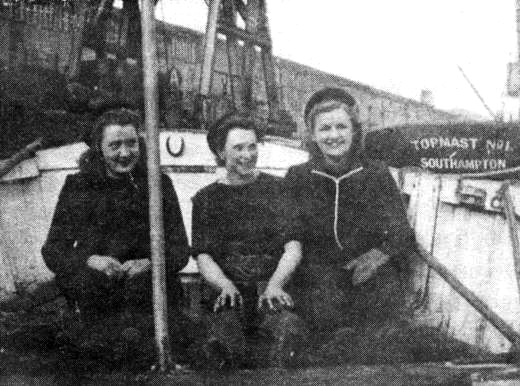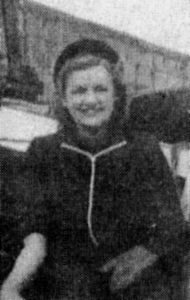Editor’s Note: Rozelle Raynes joined the Women’s Royal Naval Service in August 1943. Her memoir, Maid Matelot, was published in 1971. It is subtitled ‘Adventures of a Wren Stoker in World War II.’ This extract from Maid Matelot is included here by permission of the author, who has been a member of the D-Day and Normandy Fellowship since 1969. The book (ISBN 0 9547467 0 8) can be purchased through bookshops or from the Thoresby Gallery, Thoresby Park, Newark, Notts NG22 9EP.
In this extract Rozelle Raynes takes up the story at around 8.30am on 5 June 1944:
I awoke from a dreamless sleep to find that someone was squeezing a spongeful of ice-cold water over my face. A signal had just come through from the boats’ office to say that all of us were wanted at Town Quay [Southampton] immediately. I had not bothered to undress that night, so it took no more than a couple of minutes to pull on my sea-boots and duffel coat, brush my hair and ram a cap down on top of it. Ten minutes later we were lined up in front of Horace Sherwood, listening to what he had in store for us.
‘There are three personnel landing craft which have broken down somewhere near the Needles,’ he told us, ‘And I’m sending you girls down there on the Chokka [a black tug] to bring them back. I know some of you would rather stow away on a ship that’s bound for France, but the navy won’t allow that and this is the best I can do for you!’
At 10a.m. we were all aboard the Chokka, steaming down the River Test towards Southampton Water. Although the wind was no longer blowing gale force there was plenty of it, and we were soaked to the skin before we had gone very far. Presently the sun came out and Frank, the coxswain, let Winkle [Joan Preece] and I and some of the others steer the tugs in turn. Bryn was down in the galley making cocoa, and from the open hatch cover above the engine-room came the clear beautiful notes of Alf’s voice, singing ‘Roses of Picardy’, and a thin spiral of pungent smoke from the P.O.’s pipe.
All around us the great armada was on the move. There were all the ships we knew so well; the Force Pluto ships from Abatos, the infantry landing-craft from Tormentor, all the hundreds of tank landing-craft from Southampton; K Squadron, N Squadron, the Mark Vs and D.15 Flotilla; so many of our favourite ships, all flying barrage-balloons, like silver bumble-bees sailing amongst the fast-moving clouds. Then there were the armed merchant cruisers, destroyers, minesweepers, corvettes, trawlers and ocean tugs, every one of them moving southwards towards Normandy and a fate unknown.
At last the great day had come; the tension was broken and the soldiers and sailors laughed and cheered as our little tug kept pace with them, clouds of rainbow-tinted spray breaking over her stubborn black bows. One man leant over the stern of his landing craft as it gathered way and called out to us: ‘You’re the last bit of Old England we’ll see for a while, girls, and you sure look worth fighting for!’
* * *
Once the first thrilling news of the invasion had been received and absorbed by all of us in Southampton, a period of waiting ensued which was enshrouded in a grey blanket of depression. Up and down Southampton Water the mooring-buoys bowed and curtsied to the flood and ebb, the only physical objects in sight on that long monotonous stretch of water. All the ships that used to swing to those buoys, all our favourite ships and the ones we did not care for so well and our tea, chocolate and rum ships had gone; and no one knew if or when they would ever return.
We scrubbed and polished our boat until it shone like an oriental sunrise; I drained the oil out of the sump and filled it with fresh oil, cleaned the plugs and carburettor and did a few other maintenance jobs on the engine. We returned to Bridell Lodge in Shirley next afternoon and immersed ourselves in vast piles of dhobying; but to do any of these things required an enormous effort of will-power, as a lethargy born of too little sleep and a sense of unutterable anticlimax had gripped us in its powerful embrace.
Three days later we were jerked out of our selfish brooding by a scene which I shall never forget. An armed merchant ship came alongside the Royal Pier and several hundreds of German prisoners disembarked from her under the supervision of a strong military escort. We stood outside the band-room watching them as they shambled down the gangway and lined up along the whole length of the pier. I am not sure what I had expected to see, but in that precise moment I suddenly became aware of the indescribable tragedy and horror of war. These were no proud and noble specimens of the Aryan race, but a pathetic collection of under-fed, tired and ill-looking youths wearing the ragged remains of their uniforms, with a forlorn and hopeless look in their eyes which made it impossible to view them objectively as the dreaded Huns, the greatest enemies of the human race.
Last of all a mangy black mongrel came down the gangway, one more bit of flotsam and jetsam in the tide of war; he trotted up to one of the prisoners and fixed him with a look of such single-minded devotion that I almost burst into tears when the wretched beast was hustled into a police van and the black doors shut irrevocably behind him.
An order was given at the far end of the pier and the hordes began to move. Many of them were wounded and the stretcher-cases were carried by those who were strongest amongst them. A great silence seemed to fall on the dock area in Southampton, broken only by the shuffling footsteps of hundreds of miserable Huns.
The following day more ships came alongside the pier to unload their cargoes of wounded British soldiers, and the only thing which relieved the horror of that day was an inspection of our quarters by Superintendent Curtis. No doubt all the preparation involved for this event was specially designed to keep our minds and eyes off the unhappy scenes around us.

Rozelle Raynes (right) at Town Quay, Southampton in February 1945

